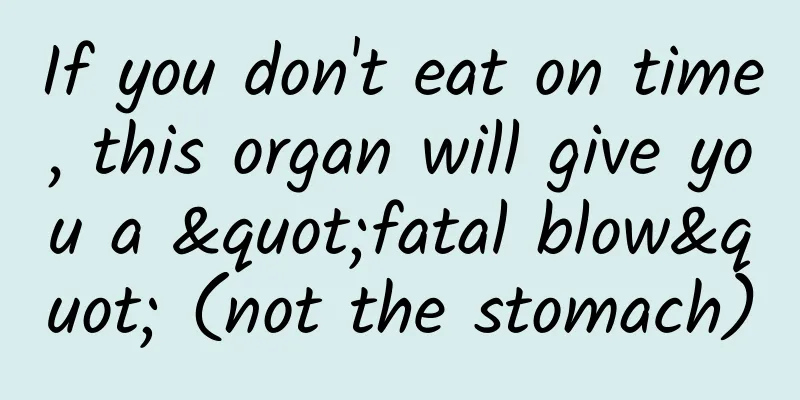If you don't eat on time, this organ will give you a "fatal blow" (not the stomach)

|
Many "workers" To sleep more in the morning Will continue to compress the breakfast time Even cancel directly Once you enter the holiday Or one meal a day Either eat whatever you want There is no rule. Image source: CCTV News In the long run Stones in the body It was eaten up little by little. Eating a lot or not eating Can cause gallstones Eating a lot of high-fat, high-oil, high-salt, and high-cholesterol foods will increase cholesterol, turn it into crystals, and produce gallstones. High-risk population Patients who lose weight rapidly , who take a very low-calorie diet (less than 800 kcal/d), or who lose weight rapidly after gastric bypass surgery also have a higher rate of gallstone formation. ▲ However, the formation of gallstones is not only related to diet. Obese people, especially women, have a higher concentration of cholesterol in their bile, and their secretion and synthesis of cholesterol are also higher, which makes them more likely to form gallstones. For women who have had multiple pregnancies, pregnancy will increase the concentration of cholesterol in their bile. During pregnancy, progesterone will delay gallbladder emptying, and increased abdominal pressure will affect gallbladder emptying. Bile that stays in the gallbladder for a long time is prone to forming stones. ▲ In addition to these two groups, long-term vegetarians do not consume enough lecithin, and the excessive fiber in vegetarian food hinders the absorption of bile acid, which reduces the concentration of bile salts in bile. The imbalance caused by insufficient lecithin and bile salts can also promote the formation of stones. Repeated attacks of gallstones and continued blockage of the pathways may develop into acute cholecystitis, acute suppurative cholangitis , acute pancreatitis and other acute and severe diseases, which may manifest as various symptoms, including severe abdominal pain, fever, chills and jaundice, which can be life-threatening in severe cases. Only 4 steps! From skipping breakfast to gallbladder cancer first step Skipping breakfast The liver produces bile for us every day. When we don't eat, the bile is stored in the gallbladder, which concentrates the thin bile by 90%. When we eat, the gallbladder discharges the concentrated bile into the small intestine to help us digest the fat (oil) nutrients in the food. If you don't eat breakfast, the concentrated bile in the gallbladder will not be discharged. Step 2 Gallstones If we do not eat breakfast for a long time, the bile in the gallbladder will be concentrated, and over time we will develop gallstones. Step 3 cholecystitis If gallstones are not controlled, acute cholecystitis may occur, and the patient will experience abdominal pain, fever, cramps in the right upper abdomen, nausea and vomiting, etc. Surgery may even be required for treatment. Step 4 Gallbladder cancer Gallbladder cancer is closely related to gallstones and cholecystitis. Statistics show that more than 85% of gallbladder cancer patients have gallstones. Gallstones cause long-term chronic inflammation of the gallbladder, which in turn induces tumors in the gallbladder mucosa. Once chronic inflammation of the gallbladder occurs, the chance of inducing cancer will increase. How does the gallbladder work? The gallbladder has two major functions, including digestion and immunity . Bile is secreted by liver cells, with a daily output of about 800~1200ml. The newly secreted bile is golden yellow and contains a variety of ingredients that promote the digestion and absorption of fat. 97% of bile is water, and the rest is composed of cholesterol, bilirubin, inorganic salts, etc. It has the functions of lipid digestion and absorption, and clearing metabolic waste from the body. The bile flows into the common hepatic duct, and the gallbladder begins to frantically absorb water and electrolytes in the bile. This operation turns the bile into concentrated bile. Loyalty In addition to these two functions, the gallbladder also has a good friend - the liver. When the liver is diseased and plagued by diseases such as cirrhosis and hyperbilirubinemia, the gallbladder is in danger. At this time, the cholesterol and bilirubin in the bile will exceed the standard, and the excess will turn into crystals and deposit in the gallbladder or bile duct like sand, accumulating into "gallstones". How to protect the gallbladder? Say no to greasiness Generally speaking, greasy foods are often accompanied by a lot of fat. To prevent excessive intake of invisible fat, it is best to eat less visible fat, such as fatty meat, animal oil, etc. Drink less alcohol and more water Quitting drinking can reduce the adverse stimulation to the gallbladder. Eat on time Eat three meals a day with balanced nutrition. The content of saturated fat in the diet should be low, and the content of fiber and calcium should be high to reduce the concentration of hydrophobic lithogenic bile acid in bile. Eating on time can reduce the saturation of cholesterol in bile and alleviate cholestasis by promoting gallbladder emptying. For patients receiving total parenteral nutrition (TPN), try to shorten the duration of total parenteral nutrition (TPN) and resume gastrointestinal nutrition as soon as possible. Proper weight control Overweight and obese people should lose weight, but weight loss should be gradual (<1.5 kg/month) to reduce the risk of bile stasis causing sludge formation. People who lose weight rapidly due to very low calorie intake or bariatric surgery should not consume less than 7-10 g of fat per day to ensure good gallbladder contraction and bile circulation function. Regular physical activity You should pay attention to proper physical exercise, such as swimming or running, to reduce obesity, avoid cholecystitis or gallstones, and go to the hospital regularly for gallbladder ultrasound examination. |
<<: Hoarseness is so common, why does it never get better?
Recommend
How to match short boots
Every girl has boots, and there are many types of...
What are the dangers of uterine dysplasia?
The uterus is where life is conceived. Only when ...
Why does a girl's vulva itch?
Nowadays, many women suffer from various gynecolo...
Why do I get fatty liver even though I am not fat at all? Learn more about the "not simple" fatty liver
Zhou Zhou is a beauty-loving lady. She is well-pr...
Do sharks dare to eat blue whales? What is the smallest shark in the world?
Sharks live in the ocean and are the most ferocio...
What foods can relieve labor pain?
The labor pains before delivery make many expecta...
How can women improve their physique?
With the development of the economy, people are p...
[Rare] Her uterus is 50 times the size of a normal person!
The uterus is a symbol of women and a cradle of l...
Can I eat before having an abortion?
There are often various accidents in life. Today&...
Bad tone of voice can cause trouble, is it you?
In life, we cannot avoid dealing with people all ...
One week pregnant, stomach pain
After a woman becomes pregnant, her body function...
Remember these six tips to avoid pain when injecting insulin
Some diabetics often feel pain when injecting ins...
Illustration of the happy pulse and normal pulse
The difference between a happy pulse and a normal...
What is the preserved vegetable in Meicai Kourou? How to make Meicai Kourou
The pork with preserved vegetables is golden in c...
What are the vaginal repair surgeries?
When a couple has sex for the first time, the wif...









